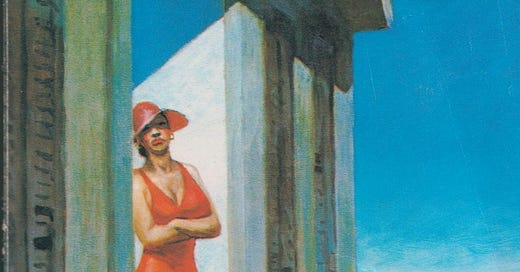Their Eyes Were Watching God by Zora Neale Hurston
"She stood there until something fell off the shelf inside her."
Their Eyes Were Watching God by Zora Neale Hurston (J.B. Lippincott, 1937)
I suspect I'm in a slightly unusual position when it comes to Zora Neale Hurston, in that I'd read a bit of her anthropology, and a bit more about her as an anthropologist, before I came shamefully late to this, her second novel and by far her most famous work.
Good, though, isn't it? Anthropological, also, isn't it? To quote our protagonist, Janie Crawford, "It's uh known fact, you got tuh go there tuh know there." The cool anthropology professor turns his chair around and sits down. Class, he says. You might think this is a novel about love and self-actualisation. But actually it's about the greatest endeavour that any human being can ever undertake. It's about fieldwork.
There's a good discussion of the anthropological substrate of the novel in Charles King's Gods of the Upper Air, his group biography of Franz Boas and his students, Hurston and Margaret Mead among them. Hurston had first worked in Florida, then moved on to study rituals in Jamaica and Haiti, and King suggests that the novel, although set in Florida, amounts to "a reimagining of geography":
Hurston's South is really a north, an extension of the Caribbean, where racial prejudice and everyday apartheid look more like the leftovers of colonialism than the innovations of Jim Crow. Myth and religion are as powerful in her description of southern life as a vodou drum circle in Haiti.
I think I'd quibble with that a little, in that I'd suggest less of a distinction and more of a commingling: here is Jim Crow but also the deeper colonial echoes; here is the religion of now but also the deeper myths of then, all layered over one another, all bleeding through. A sense that what stitches now and then together isn't an orderly progression of subjects and concepts through time, but rather a tangle of recollection and echo, storytelling and remembrance.
Storytelling is the engine and the framing: we begin with gossip around Janie's return to her home town. She sits and tells the novel to her friend Pheoby. And throughout that narrative everybody is chattering away to everybody else, swapping jokes and stories and terrible warnings. As an insult, Hurston's former mentor Alain Locke dismissed the novel as "folkloric fiction", which King notes greatly offended Hurston, and mildly offends me almost a century later. "Folklore," Hurston would say elsewhere, "is the boiled-down juice of human living." More folkloric fiction, please.
Let's talk about one tangle of storytelling in particular, chapter six, in which Hurston performs an act of merciless authorial violence on one of her characters, Janie's second husband Joe "Jody" Starks.
Near the beginning of the book, Janie's grandmother tells her that the black woman "is de mule uh de world." And sure enough, to keep her thoughts from wandering away from her domestic duties, Janie's first husband threatens to put her to work behind a plough. She leaves him for Jody, a rich man who spends his money on land and influence and is soon the mayor of a small town.
And so she becomes The Mayor's Wife, required to look after a shop she has no interest in running, and forbidden from exchanging stories and jokes on the porch with the "trashy" townspeople. Like the stories about Matt Bonner's yellow mule.
They had [the mule] up for conversation every day the Lord sent. Most especial if Matt was there himself to listen […] All they needed to see was Matt's long spare shape coming down the street and by the time he got to the porch they was ready for him.
The mule is skinny. So skinny, the women are using him as a washboard. So skinny, he has to tack to run into the wind. Feed your mule, Matt! Jody doesn't join in with the teasing but he does sit and laugh with it. But Janie notices that when "the big picture talkers were using the side of the world for a canvas, Joe would hustle her off inside the store … Look like he took pleasure in doing it."
The story of Matt's mule ends when Jody, solving problems as a rich man does, buys the poor animal and lets him roam free in the town. For this he is praised extravagantly, not least by his wife. No longer required to work, the mule puts some weight on and becomes a kind of town mascot, and when he dies he is dragged into the swamp for a riotous mock funeral.
A few chapters later, with his marriage in disarray and his kidneys in ruins, Jody dies. Janie is then wooed away from her widowhood by Tea Cake, the man who will become her third husband; he has little money and he gambles what he gets, but he sings to her, he plays checkers with her, he makes her laugh, he makes her gifts of flowering seeds, he teaches her to shoot and to fish, and in the fullness of time he will ask her to come and work side by side with him in the beanfields of the Everglades. She will say yes, gladly. Not put to work, but asked to work with. Not kept apart, but invited to live with.
And oh, poor Jody! Poor, poor Jody. Obviously, he's a terrible husband and by the end Janie's well shot of him. But to do what Hurston does here, to give the man the starring role in an anecdote that will become the parable of his own inadequacy… it's as brutal as it is delightful. He dies thinking he's the hero that saved the mule. He dies not understanding why that hasn't made him happy.



